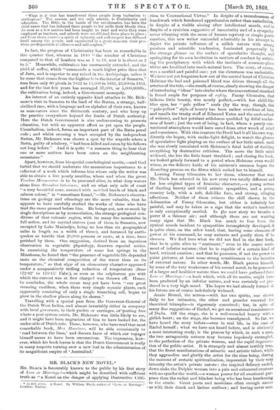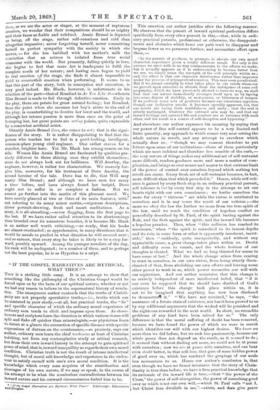MR. BLACK'S NEW NOVEL.* MR. BLACK is favourably known to
the public by his first story of Love or Marriage 1—which might be described with sufficient truth as "a Novel on the danger of applying Destructive Criti
• la &a Attire'. A Novel. By William Black, author of "Love or Marriage'" London: Tinsley.
aim to Conventional Virtue." In despite of a tremulousness of handiwork which betokened apprehension rather than assimilation, in despite of a visible aiming after intellectual moods, and in despite of a cynicism suggestive of immaturity and of a sympathy never vibrating with the sense of human mystery or simple poetic emotion, this new writer succeeded admirably in his attempt to depict the private influence of a selfish nature with strong passions and scientific tendencies, fascinated perpetually by the strange gleams on the surface of speculative thought, and I apologizing for its own hesitation in matters of conduct by satirizing the precipitancy with which the instincts of common-place virtue are fossilized into mock-natural laws. The story, of course, was a morbid and painful one ; yet the cleverness was undeniable. We have not yet forgotten how out of the central heart of Christian Helstone the bad and poisoned blood was driven through all the arteries of the tale,—the result, of course, clearly showing the danger of introducing " ideas " into circles where the conventional standard is found ample for purposes of safety. Fanny Glencairn, that hideous little beauty, was nearly perfect,—with her child-like blue eyes, her " pale yellow " curls (by the way, though, this " pale-yellow " style of beauty has been rather overdone of late, and recalls the trashy stuff of Edmund Yates and the snob-school of writers), and her petulant selfishness qualified by fitful tenderness of heart ; just the sort of being, in fact, whom a purely conventional atmosphere would have saved from utter wreck of mind and conscience. With this creature the Devil had it all his own way, directly she began, with snake-light delight, to watch the gleams of speculative light playing on the surface of her little mind, until she was slowly inoculated with Helstone's fatal habit of deciding everything by destructive criticism. The more the little mind widened, the less the little heart throbbed ; and closing the book, we looked grimly forward to a period when Helstone even would wince, as the delicate knife of his mistress's sarcasm began the dissecting process on the fibres which united her to himself.
Leaving Fanny Glencairn to her doom, whatever that was. Mr. Black has selected in his new story two totally different and far less original types of feminine character,—a young actress of dazzling beauty and vivid artistic sympathies, and a young country lady, with a soft, doll-like face, and strong, clinging affections. Neither of these evinces the skill shown in the delineation of Fanny Glencairn, but either is infinitely less painful, and may be taken as a sign that the writer's tendency is only exceptionally morbid. In the new story we breathe a purer if a thinner air ; and although there are not wanting many signs that Mr. Black has much to fear from the cynical moods incident to sympathies incompletely developed, it is quite clear, on the other hand, that, having some elements of power at his command, he may animate and purify them if he chooses. We find here what we did not find in the first book, that he is quite alive to "sentiment," even to the coarse sentiment of inferior natures ; that he is capable of a certain kind of hard, reticent emotion ; and that he possesses, if not the power to paint pictures, at least some strong sensitiveness to the beauties of external nature. In other words, Mr. Black proves himself. by some of the very weaknesses of his second novel, to be possessed of a larger and healthier nature than we could have gathered from Lore or Marriage ?—a book which, with all its merits, might have been produced by an inferior nature, and was certainly not produced in a very high mood. The hopes we had already formed of his future are of course indefinitely widened.
Annie Brunel, the actress—with her two spirits, one shown daily to her intimates, the other and grander reserved for theatrical triumphs—is vigorously conceived ; but, in spite of many fine suggestions of Rachel, we get an occasional reminiscence of Dudu. Off the stage, she is a well-rounded beauty with a girlish heart ; on the stage, she becomes transfigured. So far, we have heard the story before—even in real life, in the case of Rachel herself ; what we have not heard before, and is obviously a most interesting study, is the process by which, in such a case, the two antagonistic natures may become hopelessly entangled, to the perfection of the private woman, and the rapid degeneration of the public artist. It is strangely and almost terribly true, that the finest manifestations of mimetic and artistic talent, while they aggrandize and glorify the artist for the time being, during the moment of ecstatic spiritualization, impoverish by their very intensity the artist's private nature : the inspired delivery ended, down sinks the Delphic woman into a pale and exhausted creature with no eyes for the world,—a woman poorer for all emotional purposes than the rudest and blindest being who has been hearkening to the oracle. Great poets and musicians often enough amaze us with their dumb and listless outlines ; and having never seen
them, as we see the actor or singer, at the moment of rapturous creation, we wonder that their compositions should be so mighty and their faces so feeble and subdued. Annie Brunel is depicted as being, off the stage, rather self-conscious and cold than altogether impassive ; never forgetting herself, never committing herself to perfect sympathy with the society in which she moves, — for she has imbibed with her mother's milk the conviction that an actress is isolated from true social commune with the world. But presently, falling quietly in love, she begins to feel that more Art is inadequate to fulfil the complete needs of her nature ; and having once begun to yield to real emotion off the stage, she finds it almost impossible to yield to counterfeit emotion when performing. It seems to us that this part of the story, both in conception and execution, is very good indeed. Mr. Black, however, is unfortunate in his selection of the part—that of Rosalind in As You Like It—wherein Miss Brunel is made to fail through defective emotion. Early in the play, there are points for great natural feeling ; but Rosalind, from the point when she assumes her boy's attire to the end of the play, is counterfeiting to deceive her lover and the world, and although her intense passion is more than once on the point of betraying her, her great points are acting points, quite expressible by a somewhat artificial artist.
Directly Annie Brunel lives, she ceases to act ; that is the significance of the story. It is rather disappointing to find that the person who teaches her to feel is a good-looking, intelligent, common-place young civil engineer. One rather craves for a statelier, brighter hero. Yet Mr. Black has strong reason on his side. Women like Annie Brunel are fascinated by qualities precisely different to those shining ones they exhibit themselves ; stars do not always look out for brilliance. Will Anerley, the engineer, however, is rather too characterless. We scarcely forgive him, moreover, for his treatment of Dove Anerley, the second heroine of the tale. Dove has to die, that Will may marry Miss Brunel ; and although we have seen her many a time before, and have always found her insipid, Dove ought not to suffer in so complete a fashion. But we cannot go further into the merits of this pleasant novel. We have merely glanced at two or three of its main features, with out referring to its many minor merits,—vigorous descriptions, clever portrait-drawing, fresh and smart meditations. As a story, it is all-absorbing,—never flagging, from the first page to the last. If we have rather called attention to its shortcomings than brooded over its numerous beauties, it is because Mr. Black is an author well worth criticizing,—so ready, that his books are almost overloaded ; so apprehensive, in many directions, that it would be unsafe to predict in what direction he will succeed next ; and so earnest, that every step he takes is likely to be a step forward, possibly upward. Among the younger novelists of the day, his rank will be undisputed ; to a number of them, and to perhaps not the least popular, he is as Hyperion to a satyr.



































 Previous page
Previous page